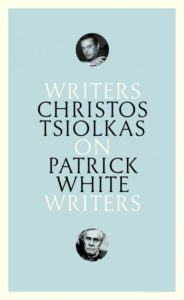Jean-François Vernay reviews “On Patrick White” by Christos Tsiolkas
 On Patrick White
On Patrick White
by Christos Tsiolkas
ISBN 9781863959797
Reviewed by Jean-François Vernay
“Perhaps, in spite of Australian critics, writing novels was the only thing I could do with any degree of success, even my half-failures were some justification of an otherwise meaningless life.”
——- Paul Brennan & Christine Flynn
If one were to pool all the relevant evidence culled from his occasional excoriations of Australian academia, one would soon realise that Patrick White (1912-1990) was hardly ever generous with local researchers, despite the bountiful critical attention he received from them. Entrusting Christos Tsiolkas — a fellow writer outside of the scholarly arena — with the daunting task of reading and writing an appreciation of the entire opus of Australia’s sole Nobel-Prize for Literature therefore comes across as a rather shrewd editorial strategy.
The idea for this third publication in the emergent Black Inc “Writers on Writers” series, was triggered by a haunting question which arose from the Cheltenham Literature Festival audience. Back in 2015, one of the attendees queried: “Christos, what do Australians think of Patrick White these days?” (2). Interestingly, that same question — in a slightly different wording: “Is anyone reading Patrick White nowadays?” — was put to me again and again in 2011 by fellow Australians who were befuddled as to why I would draft an editing project intended to be a tribute to Patrick White and his legacy.
Even more so since the 2006 Wraith Picket hoax, there has always been the sneaking suspicion that Patrick White is a cultural artefact of his time, a précieux wordsmith whose elitism and stylish (yet affected) eloquence would alienate him the support of modern-day publishers, if not a bourgeois intellectual estranged from the bread-and-butter concerns of the working-class people. While there is probably a grit of truth to it all, White remains, very much like Christopher Koch, one of the happy few writers who have successfully passed the duration test — even in the eyes of a skeptical reader such as Tsiolkas, who has grown from a high-schooler’s lukewarm reception to a recent infatuation of White’s literary output.
In keeping with his working-class and Greek origins, Tsiolkas chiefly praises White for pioneering “the migrant’s story” (26), for “creating an immigrant language” (21) through a “symbolic language of terrain and isolation” (37), and sees Manoly Lascaris — White’s lifelong gay partner — as instrumental in shaping White’s singular vision of the world: “It is as an Australian writer — and as an Australian writer seeing both his country and the world partly through Lascaris’s eyes — that he achieves greatness” (23). While this line could be construed as an optimistic overstatement, it is not difficult to perceive in this instance how literature responds to the desire of readers embodied as much in the reader’s horizon of expectations as in the craving need to interpret, itself derived from a need to share one’s emotional response to literary aesthetics. As Wolfgang Iser points out, “Perhaps this is the prime usefulness of literary criticism—it helps to make conscious those aspects of the text which would otherwise remain concealed in the subconscious; it satisfies (or helps to satisfy) our desire to talk about what we have read.”
In this game of literary seduction, what I would term specular desire here combines two fantasising activities: the writer’s desire subtly reflecting the reader’s through a series of shared interests and the reader’s desire which is being projected onto the writer’s. Thanks to this short monograph, readers of Loaded and Dead Europe (among other titles), who are already cognisant with Tsiolkas’s “erotics of writing”(31), will now also become familiar with his “erotics of reading” (31):
“The miracle of these perfect novels is that, from the opening sentence to the final word, the real world collapses and we are enfolded in a fictional reality that is stronger and more present than our material surroundings. The gift of being enraptured by such novels is that they continue to feed our desire as readers, to keep us hungrily reading, greedily searching for that experience once more.” (31)
A decade ago, Brigid Rooney duly noted the kaleidoscopic attempts at rekindling the literary and cultural importance of Patrick White, building up to the centenary of his birth: Whether Christos Tsiolkas’s On Patrick White partakes of that effort or is simply meant to be read as a deeply affectionate homage paid to the overwhelming importance of a heavyweight literary monster is scarcely relevant. What matters more perhaps is to discern the interplay of influences between these two eminent versatile writers, namely how Tsiolkas’s vision might now affect our reading of White’s œuvre and how White’s œuvre has revealed a new dimension of Tsiolkas’ mind.
Citations
Paul Brennan & Christine Flynn (eds.), Patrick White Speaks (Sydney: Primavera Press, 1989), 15.
David Coad & Jean-François Vernay, Patrick White Centenary: A Tribute, CERCLES 26, Special Issue (2012).
For further particulars, see Jean-François Vernay, A Brief Take on the Australian Novel (Adelaide: Wakefield Press, 2016), 203.
JEAN-FRANCOIS VERNAY’s latest released books are The Seduction of Fiction (New York: Palgrave, 2016) and A Brief Take on the Australian Novel (Adelaide: Wakefield Press, 2016).